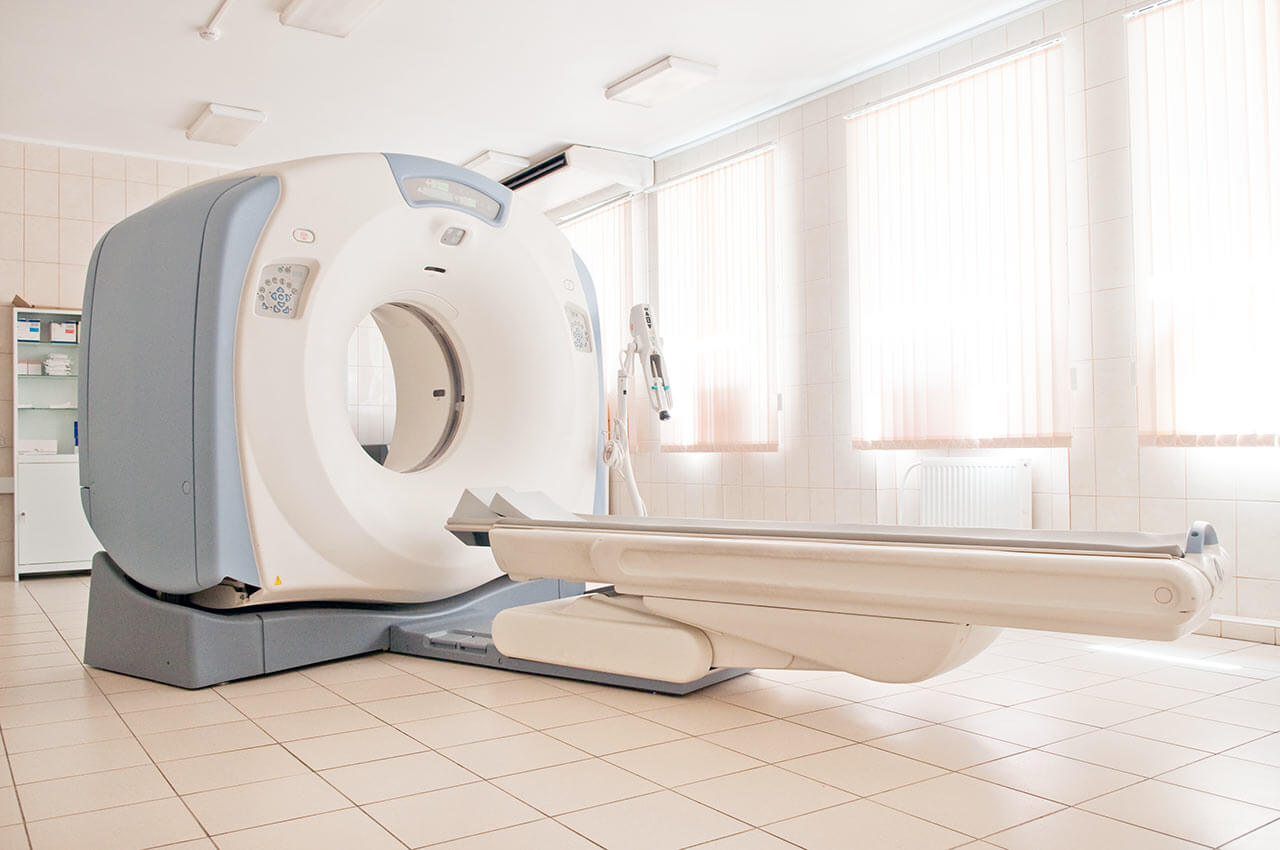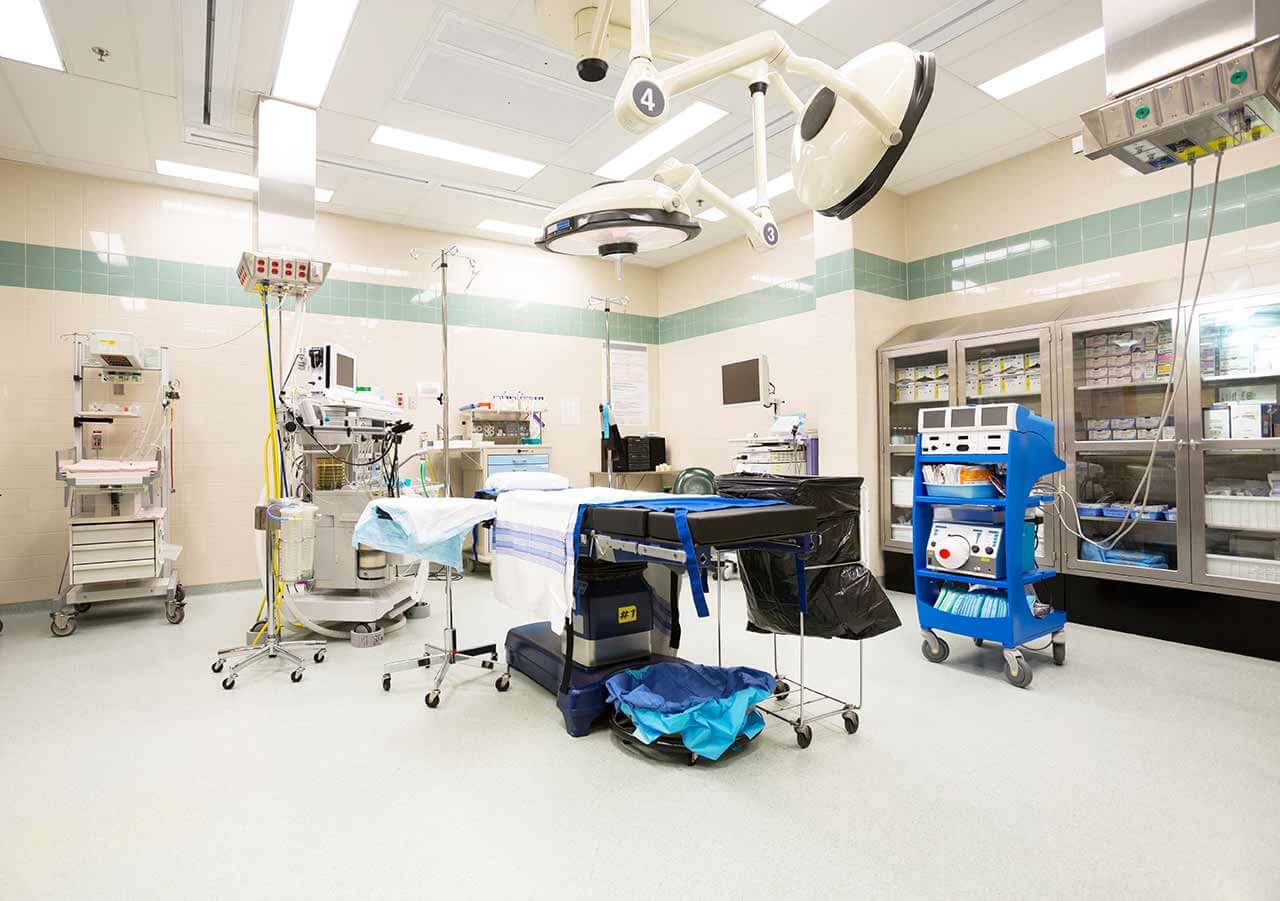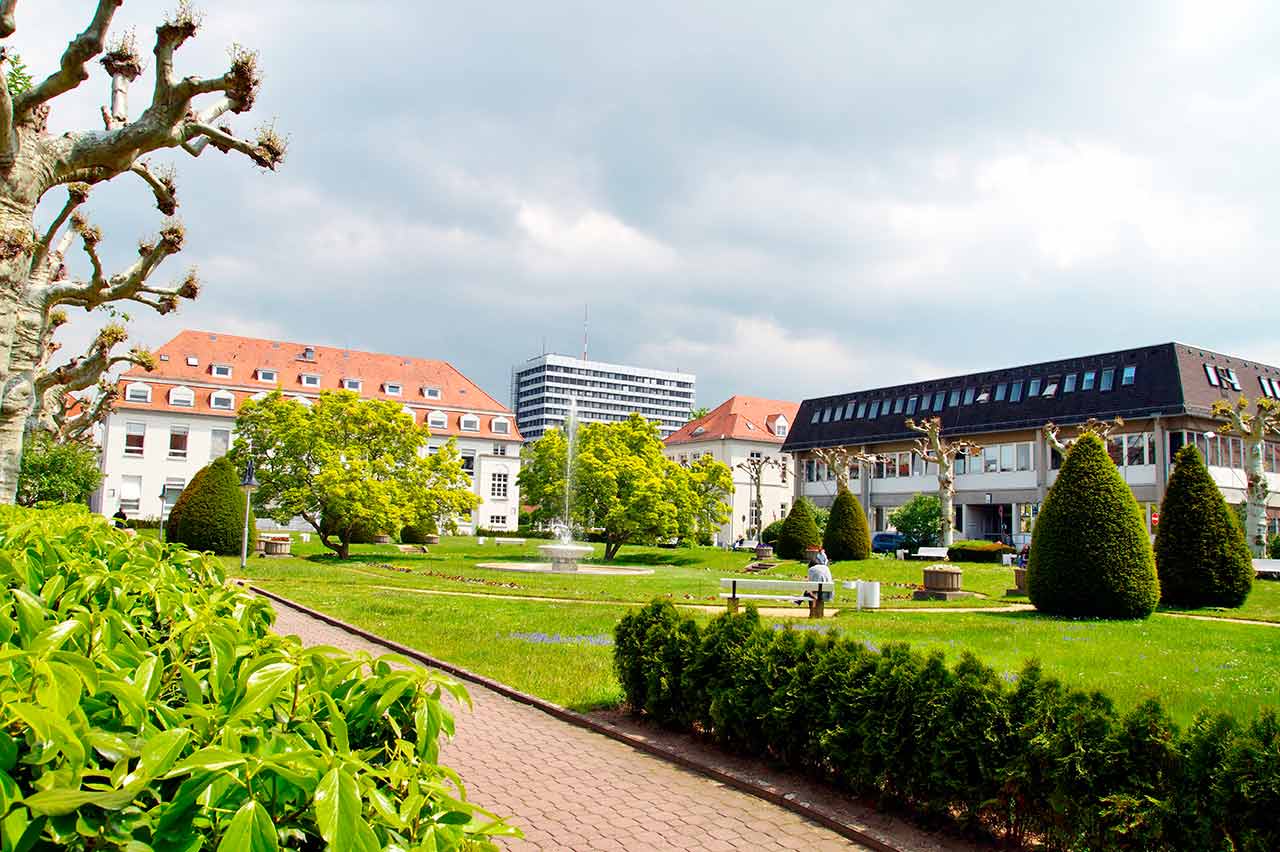
The program includes:
- Initial presentation in the clinic
- clinical history taking
- review of medical records
- physical examination
- laboratory tests:
- complete blood count
- general urine analysis
- biochemical analysis of blood
- TSH-basal, fT3, fT4
- tumor markers
- inflammation indicators (CRP, ESR)
- indicators of blood coagulation
- abdominal ultrasound scan
- CT scan/MRI or PET-CT of abdomen
- preoperative care
- cytoreductive surgery to remove visible tumors
inside the abdomen and HIPEC - histological and immunohistochemical
examination of removed tissues - symptomatic treatment
- cost of essential medicines
- nursing services
- stay in the hospital with a full board
- accommodation in a 2-bedroom ward
- elaboration of further recommendations
How program is carried out
During the first visit, the physician will conduct a clinical examination and go through the results of the available diagnostic tests. After that, you will undergo the necessary additional examination, such as the assessment of liver and kidney function, ultrasound scan and tomography of the abdominal organs. Based on the results of the examination, the physician will choose the surgical technique and the type of anesthesia. After that, preparation according to the preoperative standard will start.
Cytoreductive surgery begins with general anesthesia. The intervention is performed as open surgery, i.e. through the incision in the anterior abdominal wall, so that the surgeon can carefully examine the peritoneum and the surface of the abdominal organs. The surgeon removes affected by the malignant process ovaries, areas of the peritoneum and metastases in other internal organs. This stage of the operation can take several hours, since the overall effectiveness of the treatment depends on the completeness of the malignant tissues removal.
At the next stage of the operation, the surgeon inserts several catheters into the abdominal cavity. Through the catheters, a heated solution of a chemotherapy drug is pumped inside. The special system maintains the required temperature (42-43 degrees Celsius), pressure and circulation rate of the medicinal solution. The solution mechanically flushes out blood clots and remnants of malignant tissues, and a heated chemotherapy drug destroys micrometastases in internal organs and lymph nodes (micrometastases can’t be detected by the naked eye).
After 1-1.5 hours, the chemotherapy drug is removed from the abdominal cavity and the abdominal cavity is washed with saline. After that, the surgeon removes the catheters and sutures the incision of the anterior abdominal wall.
After the completion of the operation, you will be transferred to the ward of the intensive care unit, under the round-the-clock supervision of doctors and nurses. In 1-3 days after the operation, your drains will be removed and you will be transferred to a regular ward for further recovery. The whole treatment takes 10-12 days on average.
Finally, the attending physician will evaluate the results of control examinations, schedule the date of discharge from the hospital and give you detailed recommendations for further follow-up and treatment.
Required documents
- Medical records
- MRI/CT scan (not older than 3 months)
- Biopsy results (if available)
Service
You may also book:
 BookingHealth Price from:
BookingHealth Price from:
About the department
The Department of Obstetrics, Adult and Pediatric Gynecology at the University Hospital Mainz offers the full range of services in these fields. The department is the Level I Perinatal Center, therefore it provides first-class pregnancy management, childbirth, and care in the postpartum period. An important focus in the field of gynecology is the interdisciplinary treatment of breast cancer and diseases of the female reproductive system. The department also specializes in the treatment of pelvic organ prolapse and urinary incontinence. The medical team of the department has innovative equipment for performing sparing, minimally invasive interventions that allow for quick patient’s recovery.
The department is headed by Prof. Dr. med. Annette Hasenburg, who was included in the rating of the top German physicians of 2018, according to the prestigious Focus edition!
The treatment of breast cancer and oncological diseases of the female reproductive system is one of the priorities of the department. The department conducts many studies in this field aimed at improving the methods of therapy. Each clinical case is considered during tumor boards with the participation of specialists in the field of gynecology, oncology, radiology, chemotherapy, etc. The doctors of the department practice all modern diagnostic and therapeutic methods that meet the requirements of the German Society of Gynecology and Obstetrics, as well as specialized working groups. Since the emotional attitude plays crucial role in the successful treatment, highly qualified psychologists work with patients. Within the self-help groups, patients can exchange experiences and get support.
In addition, the doctors of the department are convinced that the best option is to prevent the disease. Therefore, they offer high-precision diagnostic studies to identify the smallest pathological changes and take the necessary measures to prevent the progression of pathology.
In the field of obstetrics, expectant mothers are guaranteed the best possible safety and optimal care during and after childbirth. The department has at its disposal five modernly equipped maternity rooms. In one of the delivery rooms there is a possibility of giving birth in water (in a special bath). The department also has an intensive care unit for newborns in order to provide immediate care in the event that health problems are detected in the baby.
The service range of the department includes:
- Diagnostics and treatment of breast diseases in women and men
- Diagnostics and treatment of malignant gynecological diseases (breast, uterine, cervical, ovarian, vulvar and vaginal cancers) within the specialized center certified by the German Cancer Society
- Surgical treatment (many operations are performed with the use of minimally invasive techniques)
- Drug therapy
- Adjuvant chemotherapy
- Neoadjuvant chemotherapy
- Palliative chemotherapy
- Antihormonal therapy
- Antibody therapy
- Immunotherapy
- Clinical trials
- Psycho-oncological care
- Self-help groups
- Follow-up care and patient monitoring
- Diagnostics and treatment of cervical dysplasia, other pathological changes in the skin and mucous membranes of the genitals
- Diagnostics and treatment of endometriosis
- Surgical treatment (minimally invasive methods)
- Hormone therapy
- Diagnostics and treatment of problems with conception and pregnancy
- Diagnostics
- Medical history collection and comprehensive medical examination
- Consultation with the necessary specialists after receiving the examination results
- Evaluation of hormonal levels
- Monitoring of menstrual cycle regularity
- Ultrasound examination of the fallopian tubes and their patency (HyCosy)
- Ovulation monitoring (with the use of ultrasound)
- Vaginal ultrasound, including 3D imaging
- Diagnostic and surgical laparoscopy (for example, removal of uterine myomas, restoration of fallopian tube patency)
- Therapy
- Regeneration of the ovarian and menstrual cycle
- Treatment of ovulation disorders
- Intrauterine insemination
- In vitro fertilization
- Embryo transfer
- Diagnostics
- Obstetric services
- Prenatal diagnosis
- Childbirth and anesthesia during childbirth
- Intensive care for newborns
- Cesarean section
- Diagnostics and treatment of gynecological diseases in children and adolescents
- Genital trauma
- Inflammation and adhesions of the labia
- Premature puberty
- Diagnostics and treatment of prolapsed pelvic organs and urinary incontinence (urogynecology) within the certified center
- Other diagnostic and therapeutic options
In addition, the department specializes in performing the following gynecologic interventions:
- Minimally invasive surgery
- Removal of uterine myomas
- Partial or total removal of the uterus
- Surgery to treat cervical cancer (with the removal of lymph nodes)
- Sterilization
- Interventions in ectopic pregnancy
- Removal of ovarian cysts
- Removal of ovaries (ovariectomy)
- Interventions in problems with conception and pregnancy
- Laparoscopic adhesion separation (adhesiolysis)
- Detection of causes of chronic pelvic pain
- Interventions to treat endometriosis
- Interventions to treat prolapsed pelvic organs
- Abdominal and vaginal surgery
- Abdominal hysterectomy (with removal or preservation of appendages)
- Plastic surgery to reduce the volume of the abdomen
- Vaginal hysterectomy (with removal or preservation of appendages)
- Abrasion
- Cervical conization (classical and laser methods)
- Vaginal plastic surgery for congenital uterine and vaginal aplasia (Mayer-Rokitansky-Küster-Hauser syndrome)
- Plastic correction of vulvar defects
- Corrective surgery after circumcision
- Cancer surgery
- Radical removal of tumors (with the removal of lymph nodes) in malignant diseases of the cervix, endometrium and ovaries
- Total cytoreduction
- Pelvic exenteration with organ reconstruction (for example, bladder replacement)
- Vulvectomy with inguinal lymphadenectomy (with functional and cosmetic flap reconstruction)
- Other surgical interventions in the field of gynecology
Curriculum vitae
- 1981 - 1987 Study of Human Medicine at the Ruhr University in Bochum.
- 1982 - 1987 German Foundation Scholarship (Studienstiftung des Deutschen Volkes).
- 1987 3rd State exam and admission to medical practice.
- 1988 American state exam, certificate of the Educational Commission for Foreign Medical Graduates.
Clinical and Scientific Activities
- 1989 Doctoral thesis defense, Ruhr University in Bochum.
- 1988 - 1989 Internal Medicine, Evangelical Hospital Herne, Academic Hospital of the Ruhr University in Bochum (Prof. Dr. med. K. Hackenberg).
- 1989 - 1996 Gynecology and Obstetrics, Marienhospital Herne, University Hospital Bochum (Prof. Dr. med. K. Quakernack).
- 1996 Examination to become a certified Medical Specialist in Gynecology and Obstetrics.
- 1993 - 1996 Partial specialization in Psychotherapy, Institute for Psychotherapeutic Medicine, Psychotherapy and Psychosomatics, Duesseldorf.
- 1996 - 1998 Postdoctoral Fellowship, Department of Obstetrics and Gynecology, Section of Oncology, Baylor College of Medicine, Houston, Texas, USA.
- 1998 - 1999 Completed training for an additional qualification in Psychotherapy.
- 1999 - 2016 Leading Senior Physician in the Department of Gynecology and Obstetrics at the University Hospital Freiburg, as well as a Member of the UFK Executive Board, Coordinator of the Center for Gynecologic Oncology, Press Secretary of the Center for Gynecologic Tumors at the Comprehensive Cancer Center Freiburg.
- 2001 - 2008 Head of Outpatient Clinic for Chemotherapy.
- 2009 - 2016 Head of the Department of Gynecology and Gynecologic Oncology.
- 19.12.2002 Habilitation.
- 10.2006 Appointed as a Visiting Professor.
- 06.2009 Qualification in Gynecologic Oncology.
- 2009 Invitation to the position of W4 Professor at the Ruhr University in Bochum (rejection).
Additional Qualifications
- 2002 Certificate in Gynecologic Oncology, German Cancer Society.
- 2002 Optional advanced training in the field of Special Surgical Gynecology.
- 2002 - 2003 Completion of training "Leadership and responsibility in practical medicine", Württemberg Academy for Administration and Business Management.
- 03.05 - 04.06 Qualification in the Didactics of Medicine I and II, Competence Center for the Study of University Didactics Baden-Württemberg.
- 04.06 Specialization in Gynecologic Oncology.
- 06.2009 Qualification "Effective Management and Performance", Malik Management Center, St. Gallen.
- Since 10.2012, Distance learning course, Master of Health Business Administration.
- 11.2012 Certificate in Minimally Invasive Surgery (MIC II).
- 12/2012 European Qualification: Member of the European Committee of Sexual Medicine (FECSM).
- 09.2015 Specialization in the field of Special Obstetric Services and Perinatal Medicine.
- 04.2017 Qualification in the Genetic Counseling within the framework of diagnostic genetic testing in accordance with the criteria of GenDG and the German Consortium for Hereditary Breast and Ovarian Cancer.
Scholarships and Internships Abroad
- 07.1985 - 08.1985 St. Barnabas Hospital, Transkei (Tropical Medicine), South Africa.
- 1996 - 1998 Postdoctoral Fellowship, Department of Obstetrics and Gynecology, Section of Oncology, Baylor College of Medicine, Houston, Texas, USA.
Membership in scientific Societies
- Since 1991, German Society of Gynecology and Obstetrics (DGGG).
- Since 1997, German Cancer Society (DKG).
- Since 1999, Working Group on Gynecologic Oncology (AGO).
- Since 2000, German Society of Ultrasound in Medicine.
- Since 2000, Society of Gynecology and Obstetrics of the Upper Rhine.
- Since 2001, German Medical Association.
- Since 2002, Working Group on Gynecologic Oncology (AGO-OVAR).
- Since 2002, European Society of Gynecologic Oncology.
- Since 2002, Member of the Faculty of the German Cancer Society.
- Since 2004, Member of the Representative Meeting of the Regional Medical Association of South Baden.
- Since 2007, Research Group of the Working Group on Gynecologic Oncology (AGO-SLG).
- Since 2011, Information Center for Sexuality and Health.
- Since 2012, International Society of Psycho-Oncology.
- Since 2013, International Society for Sexuality and Cancer (ISSC).
Peer Review Activities
- Geburtshilfe und Frauenheilkunde.
- International Journal of Cancer.
- Anticancer Research.
- Gynecologic Oncology.
- Human Gene Therapy.
- International Journal of Gynecological Cancer.
- Gene Therapy in Gynecological Cancer.
- Journal of Gynecologic Surgery.
- Annals of Hematology.
- Die Zeitschrift für Frauen in der Medizin.
Photo of the doctor: (c) Universitätsmedizin der Johannes Gutenberg-Universität Mainz
About hospital
The University Hospital Mainz is one of the best maximum care medical facilities in Germany and an internationally recognized scientific center. There are more than 60 departments and institutes, which represent all fields of modern medicine. The hospital serves more than 68,000 inpatients and more than 273,000 outpatients annually, which testifies to the excellent reputation of this medical institution.
The key to the successful clinical practice is also a highly qualified medical staff, which consists of 7.800 employees from various fields. The doctors of the hospital are convinced that each clinical case requires an individual approach, therefore, they devote much time to consultations and communication with patients. The main goal of all hospital employees is to provide an optimal medical care based on the use of the state-of-art diagnostic and therapeutic measures, as well as the introduction of the latest scientific achievements into the medical practice.
The best interns and assistant physicians are trained here. The world-famous leading physicians of the hospital share their long experience and professional skills. Naturally, an integral part of the university hospital work is research, thanks to which many innovative possibilities in the field of diagnostics and therapy have been developed.
Photo: (c) depositphotos
Accommodation in hospital
Patients rooms
The patients of the University Hospital Mainz live in bright, spacious and comfortable rooms. The patient rooms are equipped with modern electronically adjustable beds, which at the touch of a button automatically assume a specified position. Also, there is a TV and a telephone in the patient rooms. To use them, it is necessary to get a prepaid card (in vending machines at the entrance to the hospital). The use of a TV is free, but the patient will need headphones. Telephone calls are made for a fixed fee, which will be withdrawn from the prepaid card at discharge from the hospital. Also, each patient room is equipped with an ensuite bathroom with shower, washbasin and toilet.
Meals and Menus
The patients of the hospital are offered a tasty and balanced three meals a day: breakfast, lunch and dinner. The menu also includes vegetarian and dietary dishes. In addition, for both patients and their visitors there are available cafeterias and bakeries, where one can buy baked goods, snacks, hot and cold drinks.
Further details
Standard rooms include:





